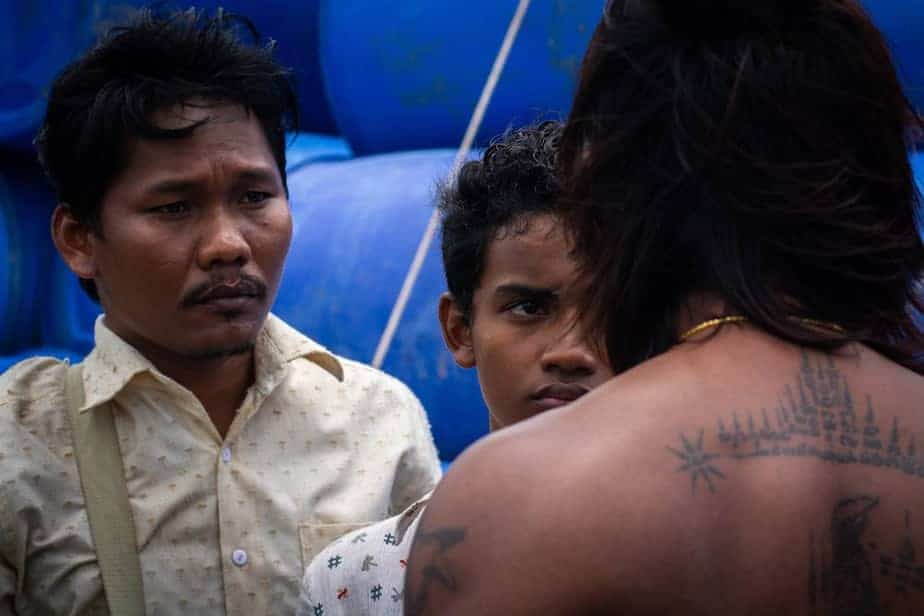BUOYANCY
Kino Lorber
Reviewed for Shockya.com & BigAppleReviews.net linked from Rotten Tomatoes by: Harvey Karten
Director: Rodd Rathjien
Writer: Rodd Rathjien
Cast: Sarm Heng, Thanawut Kasro, Mony Ros, Saichia Wongwirot, Yothin Udomsanti, Chan Visal
Screened at: Critics’ link, NYC, 9/2/20
Opens: September 11, 2020
Watching this movie, I couldn’t help thinking of the line from Gilbert and Sullivan’s “The Mikado,” “There are lots of good fish in the sea, tra la, there are lots of good fish in the sea.” We are warned that there’s a limit to the number of fish in the world’s oceans just as there’s a limit to the amount of oil in the ground, but you wouldn’t know it from the catches of a small fishing boat under the rule of the Thai captain, the unhappy catch shoveled into a pit for future sale by a group of enslaved Cambodians. Forget Gilbert and Sullivan because there is no comedy in “Buoyancy,” Australia’s entry for an Academy Award for pictures opening in 2019. If you have to compare, think of Nat Turner’s rebellion in the Virginia of 1831 or of Steven Spielberg’s film “Amistad,” its most heartbreaking scene finding a group of enslaved Africans chained together and thrown overboard by the captain.
Filmed by Michael Latham in Cambodia with Khmer and Thai dialogue, “Buoyancy” is directed by its screenwriter Rodd Rathjien, in his freshman full-length offering. This is an intense, slow-burn drama based not only on a singular event in the life of a 14-year-old boy but standing in as well for human slave trafficking in Asia involving some 200,000 victims.
Sometimes it doesn’t pay to be too bright, to think for yourself, to take risks like the hero of “Buoyancy.” Think of Chakra (Sarm Heng), whose father uses him to carry heavy sacks for use in farming rice in paddies without pay, though his dad simply has too many kids to set up a wage-earning business. Like the human caravans we in the U.S. are familiar with, the thousands of migrants from Central America who cross into the U.S. with the hope of making something of their lives, Chakra seeks to make his fortune by being smuggled into Thailand, where he is told he can make some 8,000 bahts ($255 U.S.) a month in a factory. Instead, after crossing into Thailand, Chakra and his traveling friend are sold to Rom Ran (Thanawut Kasro), the captain of a fishing boat, where they are treated like unwanted animals. Those who grumble learn quickly enough to keep quiet. Instead of complaining verbally, formerly innocent Chakra asks Rom Ran when their debt will be paid. After that he projects his dismay, his rage through his facial expressions. He does not smile once though Thanawut Kasro as the skipper loves to smirk when he announces such finality that Chakra will be on the boat “forever.”
Chakra learns soon enough that he will get nowhere following Martin Luther King Jr.’s counsel to meet hatred with love, and forget about the wisdom of Mahatma Gandhi. Violence will be the only way out, leading to the audience-expected treat that finds Chakra executing a coup d’état to take over the captaincy.
Sarm Heng doesn’t say much but his expressions serve as sign language for us in the theater. Yet the real guy to watch is Kasro in the skipper’s role. He toys verbally and physically with Chakra, and in at least one scene you might expect him to make Chakra a sex slave as well. No wonder they say that all actors aspire to the role of villain! What’s more Kasro, unlike Sarm Heng, is a professional actor with an impressive résumé, including a role in “Samurai Ayothaya” ten years ago, based on a historic figure during the Ayothaya Era about a Japanese adventurer who gained influence in Thailand.
I’d be seasick on this small boat every waking hour, which would be enough punishment for me. Yet I would have to count my blessings that I am not one of the tens of thousands of poor, innocent young people caught up in the vile human trafficking industry in the South China sea.
The film won various well-deserved awards including Best First Feature at the Berlin International Film Festival. In Khmer and Thai with English subtitles.
92 minutes. © 2020 by Harvey Karten, Member, New York Film Critics Online
Story – B+
Acting – B+
Technical – B
Overall – B+

